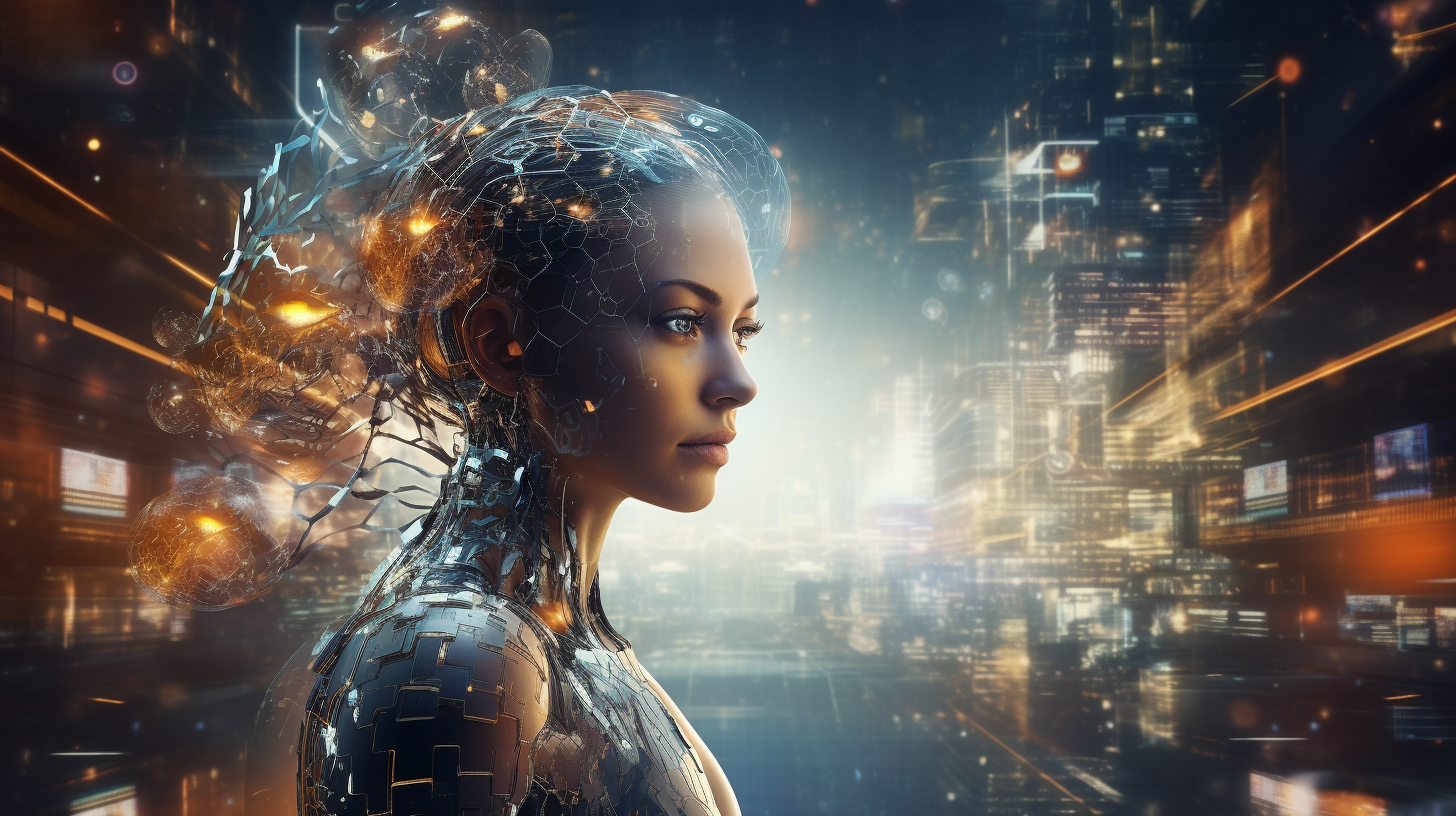7 ways digital marketers use artificial intelligence (AI)
August 4, 2023
|
John Thomas
For digital marketers to maintain a truly competitive edge in 2022 and beyond, the time is now to begin embracing and deploying AI technology.

There’s no denying that digital marketing technology is evolving rapidly. AI is one such technology taking the digital marketing world by storm. According to McKinsey, AI can generate between $1.4 trillion to $2.6 trillion in marketing and sales value worldwide.
For digital marketers to maintain a truly competitive edge in 2022 and beyond, the time is now to begin embracing and deploying AI technology.
In this article, we discuss what AI is, how it can be used in digital marketing, and five of the top use cases for AI in digital marketing.
What is artificial intelligence?
Artificial intelligence — or AI for short — utilizes advanced computing systems to complete a variety of tasks that would normally require manual, human work. This is done through key technologies such as intelligent speech recognition, visual perception, and advanced data processing.
AI can be used for many different purposes, including:
Computer process automation
Data collection and analysis
Advanced automatic decision-making
Customer service and support
Some of the most popular examples of AI include smart voice products such as Amazon’s Alexa or Apple’s Siri. These AI programs are often built into electronic products — like mobile phones and speakers — and use voice recognition technology to listen to and respond to user requests.
For instance, if a person is shopping for shoes and wants to know what department stores are nearby, all they need to do is simply ask their Alexa or Siri-enabled product where the nearest shoe store is. From here, the AI program quickly searches through web results for nearby stores and read these results back.
However, smart voice products are far from the only application of AI.
With the powerful technology used to program AI models and programs, AI is capable of a wide array of tasks including digital marketing, fraud prevention, personalized shopping, and even powering autonomous self-driving vehicles!
Keeping this in mind, let’s dive into how AI can be employed in digital marketing.
How is AI used in digital marketing?
The expectations and demands of customers evolve every day and can vary significantly depending on what industry a business or brand operates in.
As digital channels — such as social media platforms and mobile apps — become a more widely popular way for customers to shop and discover brands, marketers must work to embrace digital innovation.
Digital marketing refers to marketing strategies focused specifically on these digital channels, including:
Social media platforms
Websites and blogs
Search engines and search engine optimization (SEO)
Email marketing and newsletters
Paid advertisements (PPC, PPI, etc.)
In terms of how AI is applied in digital marketing, the technology presents many key advantages that help digital marketers make the most of their online efforts.
Let’s discuss some of these key advantages:
Trend prediction: Machine learning is a category under the broader AI umbrella. With the help of machine learning, digital marketers can develop automated algorithms that can monitor the internet and various digital channels for patterns and trends, such as key search terms that are rising in popularity or certain customer behaviors that indicate a change in customer expectations and demand. In turn, marketers can stay ahead of trends and take advantage of these trends early.
Higher ROI: Return on investment (ROI) is a massively important factor for digital marketers to consider when adopting new marketing technologies. AI offers digital marketers to make better-informed decisions when it comes to content, ad campaigns, audience targeting tactics, and more. Plus, AI provides digital marketers with the ability to perform data-driven research that can serve as much-needed support during times of rapid digital change in all industries.
Increased productivity: One of the most powerful aspects of AI is its capability to automate traditionally manual processes, such as sending out emails as part of an email campaign. Not only does this boost the efficiency of those processes but it also frees up the time of individual staff members on a marketing team, allowing them to focus more of their time on analyzing current marketing results and developing new and more effective strategies.
Enhanced audience relationships: With the power of AI on a digital marketing team, the opportunities to build enhanced connections with target audiences expand significantly. As mentioned, AI and machine learning offer the chance to build powerful predictive algorithms that help marketers understand trends and customer behavior on a much deeper level. In turn, digital marketers can better serve these customers based on their personal preferences and needs.
Greater competitiveness: Overall, AI provides digital marketers with a much sharper competitive edge. From helping to boost operational efficiency to providing detailed insights tailored to the exact audience of a particular digital marketing firm, AI simplifies necessary business processes. This makes keeping up with competitors in times of rapid digital evolution in the marketing industry an easier task to accomplish.

7 use cases for AI in digital marketing
As discussed, AI has many advantages to offer to digital marketers. These advantages are spread out across a wide range of use cases, many of which can be combined in different ways to create a more robust AI-powered digital marketing strategy.
Here are 5 of the best use cases for AI in digital marketing:
1. Content marketing and content creation
Content marketing is a discipline of digital marketing centered around the creation of different types of content that can be shared online via a variety of digital channels. Websites and social media platforms tend to be the biggest hubs for content marketing strategies.
AI can greatly improve and enhance the content marketing and creation process by:
Generating high-value headlines: Headlines of blogs and articles are arguably one of the most important elements when it comes to high-performing content. These headlines need to have the right structure and number of keywords for both readers and search engines alike to deem the piece of content valuable and worth looking at. AI can help to generate this value by assessing current trends, high-volume search keywords, and more to create the ideal headline.
Create copy and images: An AI content generator is a type of program that can create an entire piece of content for you from start to finish. While this may still require some human input — such as setting parameters for what keywords to include or what length a piece of content should be, for instance — AI-generated content can help digital marketers to release large volumes of content in quick succession that is highly valuable to their target audiences.
Personalizing content for viewers: Along with creating content start-to-finish, AI can also help digital marketers to create different variants of a piece of content that is tailored to specific readers, viewers, and audiences. Once this personalized content is created, AI can then assist digital marketers in ensuring this content reaches its intended audience.
2. Digital Marketing Automation
AI and machine learning have the powerful capability to enable advanced digital marketing automation.
This can include the automation of traditionally manual marketing tasks and workflows. For example, a multi-step ad campaign can be automated via AI and machine learning to carry out certain tasks when specific parameters are met.
Think of it like this — a customer visits a website and signs up for a newsletter. The first newsletter they receive is a welcome email that offers a coupon code for a product available on the website, which compels them to return to the website and add the product to their shopping cart.
The next step can go one of two ways — either the customer purchases the product or abandons their shopping cart. If the latter occurs, an automated parameter can be set to have the AI-powered ad campaign send a reminder email to the customer to return to their cart.
Due to the automation provided by the AI, all of these emails are sent instantly based on the customer’s actions without any human intervention required.
As a result, the only thing digital marketers need to worry about is setting the proper automation parameters, while the other essential tasks are handled by the AI-powered campaign.
3. Targeted Marketing
AI presents digital marketers with the key opportunity to create personalized marketing campaigns that speak to the exact wants and needs of individual customers.
Not only this but AI and machine learning algorithms can assess the online behavior of customers to assist digital marketers in separating these customers into specific segments.
According to a Deloitte analysis, 62% of customers are open to the use of AI to improve personalized processes offered to them by companies. A further 70% of customers state that for them to trust a brand, they want to experience trouble-free transfers between different marketing channels and the ability of marketers to adapt actions based on the customer’s previous actions.
These customer preferences require actions that can easily be carried out by AI. Using smart segmentation technology and multi-step marketing campaigns, AI-powered marketing strategies can service customers based on their current and previous behaviors.
Plus, AI-enabled data analytics make it possible for digital marketers to create more nuanced and holistic customer profiles. In turn, the ads and content these customers receive are tailored specifically to them.
4. Chatbots and Customer Relationship Management
Great customer service is a massive component in maintaining high customer retention numbers.
AI-enabled chatbots and customer relationship management (CRM) are, thus, crucial for maintaining a truly successful customer service model. With AI technology, digital marketers can utilize chatbots and online customer help desks that can provide customers with personalized advice and services.
Moreover, AI technology also helps to increase operational efficiencies that reduce the time marketing staff members need to spend on data entry and other administrative tasks.
As a result, more time can be spent focused on the needs and demands of customers. AI can be deployed to handle the initial interactions with customers, using smart routing technology to send these customers through the proper channels needed to resolve an issue or query — including sending customers through to real-life staff members as needed.
5. Enhanced PPC Campaigns
While organic efforts like SEO and content marketing have reduced expenses for digital marketers, pay-per-click (PPC) ads remain a go-to tactic. Luckily, AI can drastically improve the cost-effectiveness of PPC campaigns by:
Automatically and autonomously adjusting PPC bids to ensure you acquire high-value ads that attract quality leads, while also eliminating overbidding on low-quality ads
Learning from historical data and consumer behaviors to improve AI algorithms’ understanding of trends, high-value keywords, and more in real-time
Automatically pausing ads according to specified performance indicators to prevent unnecessary losses on underperforming PPC campaigns
Creating more effective ad copy through AI-powered content creation
The bottom line
Though there are many advantages of AI for digital marketers, several challenges exist as well.
For starters, when it comes to SEO and content marketing, digital marketers must be wary of how Google and other search engines assess their content. Google can often detect AI-generated content, which can lead to negative consequences for how well a piece of content ranks on the search engine.
As such, digital marketers must be cognizant of the potential pitfalls of AI and how to meet these challenges.
Here are 3 key tips for meeting the challenge of AI as a digital marketer:
Maintain a human touch: In all of your AI-generated content, automated campaigns, and other tasks, it is crucial to maintain a human touch. This may include hiring an editor to quickly look over AI-generated content to make it sound more human or having a team that monitors AI-powered campaigns to adjust the campaign automation parameters as needed.
Work with AI experts: At the end of the day, AI is an advanced and complex technology that requires a certain level of know-how to properly use. If you plan to employ AI in a digital marketing campaign, it is important to work with a company that can not only supply AI products and software but also offers ongoing support from experts.
Listen to customer feedback: Your customers and audience are always going to have an opinion to share, especially if they begin to suspect you are relying too heavily on AI. Make sure to listen to what your customers have to say and — if negative feedback starts to flow in — adjust your strategy accordingly.
With that said AI is incredibly powerful and is well worth the investment for digital marketers. The key to working with AI is to never forget the value of human touch points — AI should be treated as a support tool for a digital marketing team, not a replacement for one.



